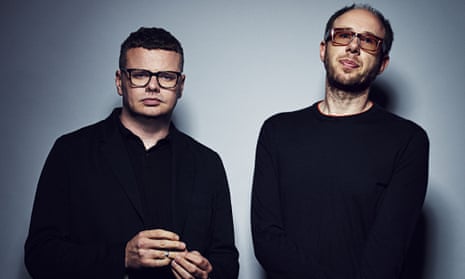If you view pop music as a perpetual war between the Oceania, Eurasia and East Asia of guitars, dance music and hip-hop/R&B, it might appear as though dance music has won. Out there it’s all rave builds and Alton Towers bass drops, house revivals and wall-to-wall superstar DJs. Even the frat boys of the US, who for years viewed electronic music as some decadent European affectation for ambisexuals, have now succumbed to EDM.
Into this fray step the Chemical Brothers, 90s dance music titans, with their eighth studio album, their most enjoyable in years. By today’s standards – that’s brostep, Rihanna feat. Calvin Harris, Tiësto – it sounds archaic, but intentionally so. There are tracks here that still skew towards song-craft rather than the dynamics tailored to today’s attention-deficit-disordered raver. The sinister and mutating EML Ritual celebrates the semi-hobbyist makers of antique synthesizers, the long-defunct Electronic Music Laboratories. Among its intriguing noises is an acrylic skid that slides all over the beat, half DJ scratch, half analogue yelp. Taste of Honey may have a dud vocal that rhymes “honey” with “money”, but it has a terrific stereo pan of a giant bee, and a surprise guitar solo, of sorts, which sounds like Jimi Hendrix warming up.
Another track, the techno of Reflexion, finds Orbital-like synth lines curdling, pitches bending and a tussle going on between man and nearly malfunctioning gear, in which the equipment sounds like it’s winning. If the early 90s are having a revival, then Ed Simons and Tom Rowland are showing everyone how it was done (that is, noisily, as though with valves) back when the hegemony of clean digital lines was a decade off.
The idea here is that the Chemicals aren’t trying for relevance by cribbing the swag of their descendants, but by doing what they do, rather more subtly than usual. The insistent, persuasive, poppy single Go couldn’t be less young. Michel Gondry, age 52, has done the video, in which girls wear clothes in front of architecture. The old-school rapper is A Tribe Called Quest veteran Q-Tip, age 45, miraculously sounding like a far younger, treblier man, referencing 70s scuba diver Jacques Cousteau. Jacques Cousteau! The beguiling title track harks back to the 80s, with Cate Le Bon, 32, intoning robotically as though she were German, rather than Welsh.
Born in the Echoes is not an unalloyed success. You rather wonder at the audacity of I’ll See You There, which recalls various older tunes such as The Private Psychedelic Reel, Setting Sun and Let Forever Be, all of which played homage to the wiggy backwards samples on The Beatles’ Tomorrow Never Knows, while album closer Wide Open is a lame duck, featuring a wet vocal by Beck (45). But their collaboration with Annie “St Vincent” Clark on Under Neon Lights is intriguingly uneasy, full of un-obvious dynamics. Tracks such as Just Bang are downright stark and all the better for it. The Chemicals could have cashed into the scene they helped create. Instead, they are crashing around, making a racket. That’s a little victory.

Comments (…)
Sign in or create your Guardian account to join the discussion